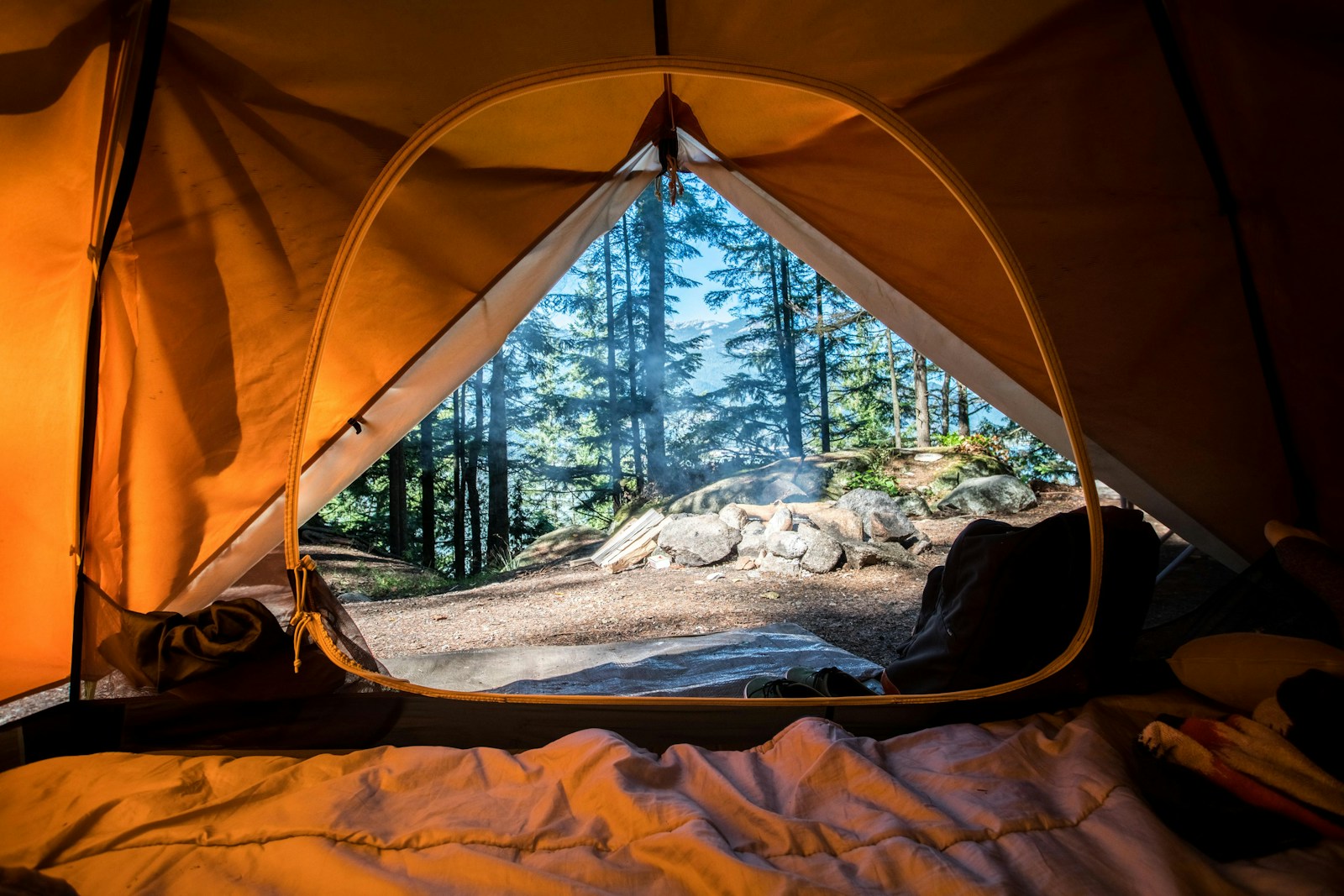Imagine this scenario: you’re out camping in the wilderness, surrounded by the serenity of nature. As you settle into your cozy tent for the night, you might not think much about the importance of proper ventilation. However, did you know that tent ventilation plays a crucial role in ensuring your comfort and safety? In this article, we will explore the reasons why tent ventilation is vital and how it can enhance your camping experience. So, don’t underestimate the power of fresh air, as we uncover the secrets behind the importance of tent ventilation.

Tent Ventilation – Ensuring Good Air Quality
Preventing Stuffiness and Stale Air
When you go camping, fresh air is one of the most important aspects of the experience. A well-ventilated tent allows you to breathe in clean, fresh air, preventing the accumulation of stuffiness and stale air. Without proper ventilation, the air inside the tent can become stagnant, leading to discomfort and a lack of freshness in the environment.
Removing Moisture and Condensation
Moisture and condensation can quickly build up inside a tent, especially in humid conditions or when cooking inside the tent. Proper ventilation helps remove this moisture, preventing the tent from becoming damp and musty. By allowing air to circulate freely, you can reduce the chances of encountering a wet and uncomfortable environment.
Reducing Odors and Fumes
Cooking, sweating, and simply spending time inside a tent can result in the buildup of odors and fumes. Without adequate ventilation, these smells can linger and make your camping experience less pleasant. Ventilation helps in dissipating these odors and fumes, ensuring a fresh and enjoyable atmosphere inside the tent.
Regulating Temperature
Preventing Overheating
During hot summer days or in locations with intense sunlight, overheating becomes a concern inside a tent if proper ventilation is not maintained. Good ventilation helps in regulating the temperature by allowing hot air to escape and fresh air to enter. This prevents the tent from becoming an uncomfortable and excessively hot space.
Managing Cold Weather Conditions
On the other hand, during cold weather camping, ventilation plays a crucial role in managing temperature as well. While it may seem counterintuitive to have ventilation when trying to keep warm, it is essential to prevent condensation and moisture buildup, which can lead to damp and chilly conditions. Proper airflow ensures that the tent remains dry and comfortable, helping to retain warmth.
Preventing Mold and Mildew
Controlling Humidity Levels
High humidity levels inside a tent can create the perfect conditions for mold and mildew growth. With proper ventilation, excess moisture is eliminated, minimizing the risk of mold and mildew formation. This not only helps in preserving the integrity of your tent but also ensures a healthier and more comfortable camping environment.
Avoiding Moisture Buildup
Moisture accumulation can occur from various sources, such as rain, humidity, or even condensation from cooking inside the tent. Without adequate ventilation, this moisture can get trapped inside, leading to dampness and potential damage to your camping gear. Ventilation helps in preventing moisture buildup, allowing you to enjoy a dry and pleasant camping experience.
Promoting Health and Comfort
Enhancing Sleep Quality
A well-ventilated tent contributes to better sleep quality. With fresh air flowing and maintaining comfortable temperature levels, you can sleep more soundly, free from stuffiness and excessive heat or cold. Good airflow also helps reduce the presence of allergens and irritants, promoting a healthier sleeping environment.
Reducing Allergens and Irritants
Allergens and irritants such as dust, pollen, and pet dander can trigger allergies or respiratory issues, compromising your camping experience. Proper tent ventilation helps in removing these particles from the air, reducing the risk of allergic reactions and ensuring a more comfortable stay for you and your camping companions.
Preventing Respiratory Issues
Inadequate ventilation can lead to higher levels of carbon dioxide and other pollutants inside the tent, which can cause respiratory problems and discomfort. By providing a constant supply of fresh air and removing harmful substances, ventilation plays a vital role in maintaining good respiratory health during your camping trip.
Improving Safety
Preventing Carbon Monoxide Poisoning
Using fuel-burning devices such as stoves or heaters inside the tent can release carbon monoxide, which is a deadly gas. Proper ventilation is essential to prevent carbon monoxide buildup, as it allows the gas to escape and fresh air to circulate. Always ensure that any fuel-burning appliances are used outside the tent or in well-ventilated areas to avoid the risk of carbon monoxide poisoning.
Eliminating Fire Hazards
Proper tent ventilation is also crucial in reducing the risk of fire hazards. Good airflow helps in preventing the accumulation of flammable gases, such as propane, which can be dangerous if trapped inside the tent. By ensuring proper ventilation, you create a safer environment for yourself and others, minimizing the risk of fire-related incidents.
Enhancing Overall Camping Experience
Enjoying Fresh Air and Nature
One of the main reasons we go camping is to immerse ourselves in nature and enjoy the fresh outdoor air. By ensuring proper tent ventilation, you can fully appreciate the natural surroundings, breathe in the crisp air, and feel connected to the environment. Good airflow not only enhances your camping experience but also allows you to reap the full benefits of spending time in nature.
Creating a Pleasant Environment
A well-ventilated tent creates a pleasant and inviting atmosphere, making your camping experience more enjoyable. Fresh air circulation and appropriate temperature regulation result in a comfortable and inviting space that you can relax and unwind in after a long day of outdoor activities. By prioritizing ventilation, you can create a welcoming environment inside your tent.
Promoting Relaxation and Well-being
Proper ventilation plays a significant role in promoting relaxation and overall well-being during your camping trip. Breathing in fresh air can have a positive impact on your mood and mental state, helping you relax, de-stress, and rejuvenate. Additionally, ensuring a comfortable temperature and reducing allergens and irritants contribute to your overall sense of well-being while camping.
Factors Affecting Tent Ventilation
Tent Design and Structure
Different tent designs and structures provide varying levels of ventilation. Some tents have large mesh windows and panels that allow for excellent airflow, while others may only have small vents. When choosing a tent, consider its ventilation capabilities based on the design and materials used.
Weather Conditions
Weather conditions can greatly impact the need for ventilation. During hot and humid days, having effective ventilation is crucial to prevent overheating. In contrast, during cold and wet weather, ventilation is necessary to manage condensation and moisture buildup without compromising warmth.
Campsite Location
The location of your campsite can also influence the ventilation in your tent. If your tent is sheltered by trees or positioned in a low-lying area with limited airflow, it may restrict natural ventilation. Choosing a location with open space and good airflow can enhance the ventilation within your tent.
Types of Ventilation Systems
Natural Ventilation
Natural ventilation relies on natural airflow through the tent, utilizing openings, vents, and mesh panels. It takes advantage of wind currents and temperature differentials to facilitate the exchange of air.
Forced Ventilation
Forced ventilation involves using mechanical fans or air circulation devices to actively move air in and out of the tent. This type of ventilation is particularly useful when natural airflow is limited, or when additional airflow is needed to regulate temperature or remove odors.
Hybrid Ventilation
Hybrid ventilation combines elements of both natural and forced ventilation. It utilizes both passive and mechanical systems to provide optimal airflow and temperature regulation within the tent. This type of ventilation system offers flexibility and efficiency in maintaining a comfortable camping environment.
Tips for Improving Tent Ventilation
Choose a Well-Ventilated Tent
When selecting a tent, opt for models that offer good ventilation features such as large mesh openings and adjustable vents. Look for tents with a well-designed airflow system to ensure a constant supply of fresh air.
Position the Tent Appropriately
Position your tent in a location that allows for maximum airflow. Avoid areas with obstacles that could obstruct natural ventilation, such as dense vegetation or walls. Additionally, consider the direction of prevailing winds to take advantage of the breeze.
Utilize Ventilation Features
Make use of the ventilation features your tent offers. Open windows, vents, and mesh panels to maximize air circulation. Adjust them accordingly based on the weather conditions and your comfort level.
Use Portable Fans or Air Circulators
In situations where natural ventilation is limited, portable fans or air circulators can be valuable additions to enhance airflow inside the tent. These devices can help improve ventilation on hot and humid days or when there is minimal natural airflow.
Monitor and Adjust Ventilation
Keep an eye on the inside conditions of your tent. Look for signs of condensation, stuffiness, or excessive heat. Adjust your ventilation accordingly by opening or closing vents and windows to maintain a comfortable and well-ventilated environment.
Conclusion
Importance of Tent Ventilation for Camping
Proper tent ventilation is crucial for a successful and enjoyable camping experience. It helps ensure good air quality, regulate temperature, prevent mold and mildew, promote health and comfort, enhance safety, and create an overall pleasant camping environment. By understanding the factors affecting tent ventilation and implementing effective ventilation practices, you can optimize your camping experience.
Planning for Proper Ventilation
When planning your camping trip, take into consideration the importance of tent ventilation. Research and choose a tent with adequate ventilation features, and be mindful of the location and weather conditions at your campsite. By prioritizing ventilation and following the tips provided, you can create a well-ventilated and comfortable space that enhances your camping adventure. Remember, fresh air is not just a luxury; it is essential for your well-being and enjoyment while spending time in the great outdoors.



Leave a Reply